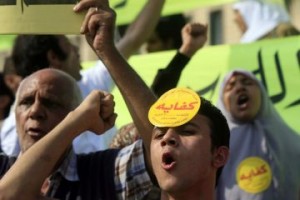Story originally published by GlobalPost on November 22, 2010:
 CAIRO, Egypt — U.S. President Barack Obama’s speech ended with a standing ovation, thunderous applause and roaring cheers from students chanting his name from the upper balcony of the auditorium at Cairo University.
CAIRO, Egypt — U.S. President Barack Obama’s speech ended with a standing ovation, thunderous applause and roaring cheers from students chanting his name from the upper balcony of the auditorium at Cairo University.
Obama’s so-called “New Beginning” speech last year offered hope to many Egyptians by calling for greater unity, respect for human rights and democracy.
But neither the speech, nor American policy toward Egypt, seem to have had much influence on the country’s long-standing leadership.
As Egyptians prepare to head to the polls for parliamentary elections this week, initial optimism has turned into the usual frustration as reports of government interference have again surfaced in the run-up to the vote, leaving many here wondering if the United States has the power to foster real change in a country that has been governed by one political party for more than three decades.
“Last year, Obama amazed every Egyptian. But with time we’ve come to see that nothing is actually happening here,” said Saleh Samy, 22, a former student who watched Obama speak from the auditorium at Cairo University. “The Americans say they want democracy, Obama gave us promises, but didn’t do anything.”
Samy is one of more than 30 million Egyptians under the age of 29 who have spent their entire lives under the leadership of one person — President Hosni Mubarak — who, along with his ruling National Democratic Party, has controlled political life, at times by force, since 1981.
Egypt is historically one of Washington’s closest allies in the Middle East, in large part because of the country’s 1979 peace treaty with Israel. As such, the Arab world’s most populous nation — with more than 80 million people — is one of the largest recipients of American foreign aid, at just under $2 billion a year.
Despite calls supporting free and impartial elections in Egypt, the Obama administration’s response to claims by opposition groups that the Egyptian government is once again interfering in the election process has been minimal – even after being rebuffed by Cairo over a request to use international monitors at Egyptian polling stations.
The American government, though, might not stay on the sidelines forever, said Andrew Albertson, director of the Project on Middle East Democracy, a Washington-based nonprofit organization.
Albertson attended a recent meeting at the White House with senior National Security Council officials and the bi-partisan Egypt Working Group. He said that, more than ever, Obama is actively seeking new ways to encourage reform in Egypt.
“They’ve completely exhausted private diplomacy with the Egyptians, but are still looking for different ways to get Cairo’s attention,” Albertson said. “It looks diplomatically weak abroad and politically weak at home for the U.S. to get rejected over requests to field international monitors at the polls on Election Day.”
On the streets of Egypt’s capital, the largest city in the Middle East, frustration with the lack of political change, and with what many residents here say is America’s complacency, is growing.
Mohamed Eid, 25, said he is disenchanted with the American response to growing political stagnancy in his country.
“It’s disappointing that the U.S. says one thing and does another,” Eid said, sitting at a small coffee shop across from the university where the Obama spoke last year. “We live under emergency law and dissidents are imprisoned, but what can we do? There is only one party in charge of everything in Egypt.”
The upcoming elections for Egypt’s lower house of parliament come at a time of relative political uncertainty, as concerns grow over the health and succession plans of the 82-year-old leader. Mubarak has never named a successor, but many here believe his son, Gamal, is being groomed for the job.
Egypt’s notoriously fractured opposition groups are hoping to finally make gains in a body that has been dominated by the NDP since multi-party elections were first held in 1976.
But the hurdles they face remain high.
Though at one point revitalized by the hope that Nobel laureate Mohamed ElBaradei, the former director of the International Atomic Energy Agency, would run for president — Egypt’s opposition remains stymied by disunity and tightly controlled electoral rules.
